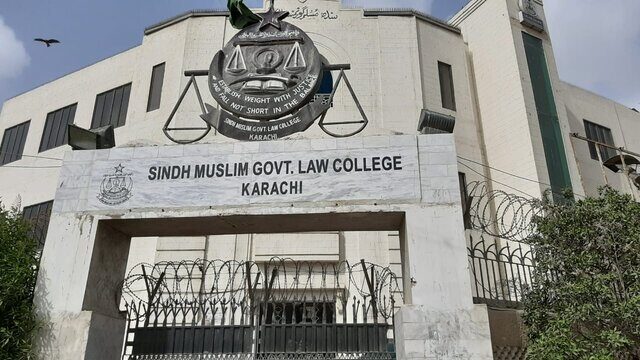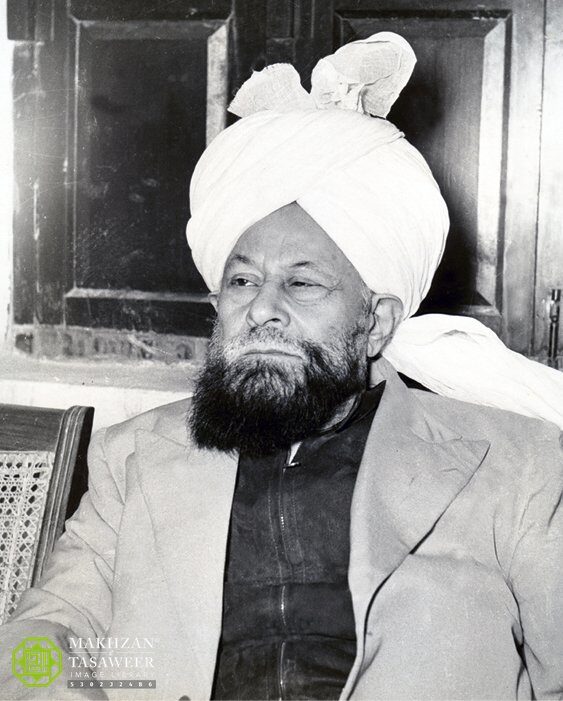Ata-ul-Haye Nasir, Al Hakam

The Sindh Muslim Government Law College had launched a quarterly magazine from Karachi titled “Pakistan Law Review”. Upon its request, Hazrat Mirza Bashiruddin Mahmud Ahmad, Khalifatul Masih IIra wrote an article in July 1952, titled “Pakistan me qaanoon ka mustaqbil” (The Future of Law in Pakistan), which was published in the August 1952 issue of the magazine.
The Sindh Muslim Government Law College is one of the oldest law schools in Pakistan, established by its first principal, Hassanally A Rahman, a leading advocate of Sindh.
At the beginning of his article, Hazrat Khalifatul Masih IIra stated:
“I am extremely pleased to know that the Sindh Muslim Law College is launching a quarterly magazine very soon to guide its readers to study law scientifically and specifically to debate the matters about the improvement of legislation in Pakistan, so that a consensus and harmony could be created among the ideologies and thoughts of the general public and law experts, and the law experts may execute their important responsibilities in a better way.” (Al Fazl, 20 September 1952, p. 5)
Huzoorra further said that the discipline of law required it to be collated in light of the human process and experience so that it could guide mankind in the best possible way.
“But unfortunately, the Asians have become completely oblivious of this important discipline, due to being ruled by foreigners for centuries. Now – as the sun of absolute freedom has dawned upon the Asians at least and its people have learned to live on their own just like [other] independent nations of the world – it has become even more important now to pay more attention and time towards studying the discipline of law on par with Western countries.
“The sovereign nations of the world – after thorough study and experience – have at last manufactured a certain path and framework for their respective country’s legislation, which perfectly fulfils their individual and national needs. Moreover, they have law experts with deep and extensive knowledge who assist in solving the new legal difficulties and complexities which arise when the [responsible] people work according to old methods.
“Anyway, the Asians face a difficulty that those who study law and have enough knowledge as well, do not have any previous experience and national traditions which could help them in drafting new laws. Therefore, the only possible way for them is to develop a new way and then face all those difficulties and hurdles which are confronted by beginners, and finally overpower them.” (Ibid)

Huzoorra continued:
“I believe that the biggest problem Pakistani people will have to face is that they have a huge majority of Muslims, and the government of Pakistan has not been established as a result of a military or national victory, rather it has been established through a consensus [among its people]. Therefore, despite having a huge Muslim majority, Pakistan will have to consider that consensus while drafting its legislation, otherwise, it will be rightly blamed for breaking a collective consensus.
“Although passion and enthusiasm are commendable traits, they can lead towards wrong actions if limits are exceeded. The separation of religion from politics in Turkey was a reaction to a similar kind of misguided religious passion. The love for Islam and desire for its establishment in one’s country are excellent sentiments but if the same sentiments are permitted to exceed the appropriate boundaries, it will cause us to move away from Islam.
“Our Holy Prophetsa had also made an accord with the Meccans, which is known in history as “Sulh Hudaibiyyah” [The Treaty of Hudaibiyyah]. One of its conditions was that if a Muslim became a disbeliever, they would be returned to Mecca; but if a disbeliever accepted Islam, they could not live in the Islamic State of Medina, rather they would be returned to their guardians and relatives [in Mecca]. This condition seemed to be harmful and humiliating for the Muslims and they also felt disrespected – even a leader like Hazrat Umarra was hesitant for a while.
“The treaty was just signed that a youngster named [Hazrat] Abu Jandalra came staggering [to Medina] whilst still shackled in chains. Whereas, his father Suhail [bin Amr] – who had just signed the treaty on behalf of the Meccans – demanded that Abu Jandalra be returned to Mecca as per the treaty. When the Muslims witnessed the practical aspect of this treaty, they considered it to be very dangerous and humiliating and raised their swords in the protection of Abu Jandalra. But the Holy Prophetsa advised them and stated:
“‘The prophets of God never break their accord.’ [Tabari, Vol. 2]
“And handed over Abu Jandalra to his father despite the Muslims’ requests full of sentiments. [Sahih al-Bukhari, Kitab al-Shurut, Bab al-Shurut fi al-Jihad, Hadith 2731-2732]
“Therefore, no matter how much sincerity and religious passion is instilled in a Pakistani Muslim, they can never claim to be immersed in the love and sincerity for Islam equal to the Holy Prophetsa. And the Holy Prophetsa has taught us a great example in this regard himself.
“If a [Pakistani] Muslim desires to be declared a good Muslim in the sight of Allah the Almighty, just as they consider themselves, then they must fulfil all those accords and promises in a true spirit, which were made to the minorities and other communities at the time of Pakistan’s establishment. If anyone draws away from fulfilling those accords, in reality, they are moving away from Islam.” (Ibid)
Then Huzoorra outlined the following points to be considered while drafting Pakistan’s laws:
“1. The spirit of Islamic teachings should always be in our mind.
“2. Our laws need to be purely compatible with human nature.
“3. We need to fulfil all promises from every aspect which have been made to the minorities.” (Ibid)
Huzoorra continued:
“According to a saying of the Holy Prophetsa, every child is born on Islamic Faith. (Sahih al-Bukhari, Kitab al-Qadar [Hadith 6599])
“Neither can Islamic laws ever be against human nature nor can human nature ever be against Islamic laws. Therefore, it is our sacred obligation to remember the above-mentioned hadith and believe in this reality that whatever Islam has taught is according to human nature. […]
“If we have correctly understood the Islamic teaching, human nature can never be against it and certainly we might ourselves be at fault [in understanding Islam]. In such a situation we need to look into this matter deeply and put effort into understanding the reality. If we consider this strong foundation, then certainly we will reach the truth very soon and succeed in drafting the best laws for our country.” (Ibid)
Towards the end, Huzoorra stated:
“Indeed, we can never satisfy all classes of the country – meaning maulvis, Western-influenced educated people, the poor and rich – but by acting on the above mentioned wise foundation, we can certainly fulfil the needs of human nature and succeed in attaining the love of Allah the Almighty.
“I pray that may Allah the Almighty enable Pakistan’s law-makers, authorities, lawyers and authors and commentators of the law books to adopt the path prescribed by Islam. And may this beneficial magazine – which is being launched by the Sindh Muslim Law College – prove to be a beneficial organ for achieving this goal.” (Ibid)
Had the government and the people of Pakistan acted on Hazrat Musleh-e-Maud’sra valuable guidance in regards to legislations, the country would have progressed immensely, and it could have avoided many setbacks – which were faced in the following years and in present-day Pakistan – due to the unjust laws.
Related Content
- Hazrat Musleh-e-Maud’s services to the Muslim cause: Guidance and support to leaders of the Pakistan Movement
- Hazrat Musleh-e-Maud’s services to the Muslim cause: Nurturing the newly formed Pakistan
- Hazrat Musleh-e-Maud’s blueprint for a successful Pakistan: Highly praised yet neglected advice
- ‘The consolidation of Pakistan’: Lectures by Hazrat Mirza Bashiruddin Mahmud Ahmad on how Pakistan can see success
- Sacrifice is the key to nation-building: Hazrat Musleh-e-Maud’s advice to the newly-formed Pakistan

